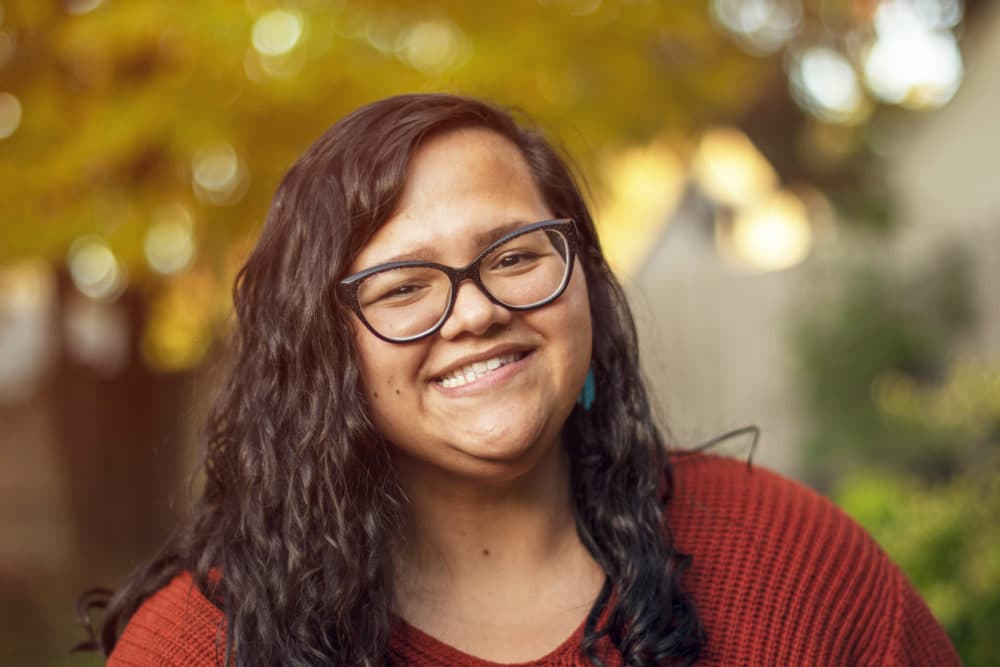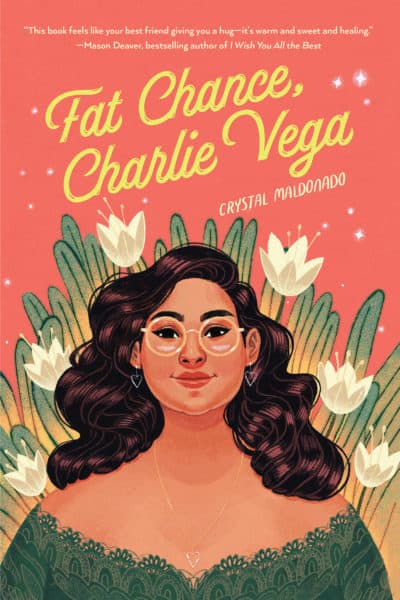Advertisement
Author Crystal Maldonado Reflects On New Novel, Body Positivity And Reclaiming The Word ‘Fat’
Centering a fat brown protagonist in a romance shouldn’t be revolutionary, but in Crystal Maldonado’s debut coming-of-age novel “Fat Chance, Charlie Vega” (out now), the author writes the representation she craved as a teen. The fat acceptance movement has helped many people reclaim the word “fat” as simply a descriptive word rather than an insult. “It’s still a radical notion to accept fat people as they are, that they don’t have to lose weight,” Maldonado says. Too often in media, women of color and fat characters are relegated to the sidelines as the quirky best friend or the comedic relief. Maldonado wants to send the message that everyone deserves to be the hero of their own story.
The archetypes of fat characters in popular media seem to be limited to characters who hate themselves and desperately want to lose weight and people who can’t control themselves around food — to which Maldonado says, “Have you ever met a fat person? I don’t always have a turkey leg in hand.” The media landscape rarely creates three-dimensional storylines for fat characters, so fat readers and viewers are barraged with explicit and implicit messages that you should hate yourself. Maldonado wishes for representation with characters whose fatness doesn’t affect their day-to-day and instead get to focus on a different story, and also characters who live with realities of the world while they’re fat, but still get to work toward their own ambitions.

The protagonist of “Fat Chance, Charlie Vega” is an aspiring writer in the suburbs of Connecticut who happens to be fat and Puerto Rican. Charlie tries to embrace body positivity through her online communities, but she receives harsh messaging from the outside world — including her own mother — that makes her think that she will always be runner-up next to girls like her best friend Amelia. Amelia is a supportive friend and acts as Charlie’s hype woman when she gets new crushes. But when Charlie finds out that the object of her affection had asked out Amelia before her, Charlie wonders if she’ll ever find someone who puts her first.
Charlie finds solace against her mother’s forceful dieting hints in online communities for feminism and the fat acceptance movement. Maldonado had come across these resources as a young adult on LiveJournal. “I don’t know which came first, they were both so ingrained with each other,” Maldonado says. “It’s all about bodily autonomy and letting people decide what’s right for them.” One of the central tenets of the movement is creating equity and respect for all body types. Maldonado says, “Why do we criticize some bodies, and not others, under the guise of health?”
Like her character, Crystal Maldonado was born and raised in central Connecticut, living there until her mid-20s. Now the author lives in western Massachusetts, so readers familiar with either locale might recognize some of the real-life inspirations for settings in the book: she describes Charlie’s hometown as a “Northampton-y mixture” and one of the bookstores Charlie visits resembles the Book Barn in Niantic, Connecticut.
Surprisingly (to anyone else who has ever taken a standardized test), Maldonado fell in love with writing during a timed writing prompt. Her third grade classmates raced to finish the test as quickly as possible while Maldonado got swept away in her story, asking for more paper to see it through. “That was the first time I remember being excited about being creative and trying to make stuff,” Maldonado says. Then, after a writing phase in middle school and early high school when she wrote stories about early 2000s boy bands, she explored different writing techniques and genres throughout the rest of high school and college. She experimented with everything from short stories, to stories with ambiguous endings, until finally landing on stories with young adult themes.
Advertisement
Romance was always a theme Maldonado was interested in writing even though she didn’t always consciously recognize that. Many of the pieces she wrote had a relationship or a pining character of some kind. She’s a person who just loves love, and she wants her characters to have happily-ever-afters. This book has the satisfying message for anyone who struggles with society’s reactions to their weight — they too can be the center of a rom-com. “You don’t always see a fat character where another person clearly likes them,” Maldonado says. “They’re usually the one pining rather than the one being desired, and I wanted to subvert that.”

Maldonado’s own love story is proof that happily-ever-afters do happen. Charlie’s relationship is loosely based on how she got together with her husband during their senior year of high school. “It was fun to relive that, the things we experienced together, and getting those butterflies,” she says. There’s a scene in the novel where Charlie’s romantic interest gives her first-ever valentine, inspired by something Maldonado’s husband had done while they were in art class. She has held onto that valentine until this day.
Another of her goals for this novel was to conceptualize and write what an imperfect family might look like. In many young adult novels that Maldonado has read, any conflict between teens and their parental figure will be neatly resolved with everyone having learned a lesson. But in real life, not everybody gets that. “It can be alienating if your experience doesn’t happen that way,” Maldonado says. “Some people have contentious relationships with the family they’re born into, and they need to learn how to navigate that and draw boundaries.”
On the other hand, Maldonado knew she wanted a strong female relationship in Charlie’s story that comes from an uplifting place of love, but could withstand an occasional fight. And that’s what she did with Charlie’s friendship with Amelia. Maldonado says, “I love friendship… we don’t often give friends the credit they deserve.”
When marginalized creators get greenlit for projects starring characters with marginalized identities, Maldonado says there’s immense pressure on those creators to get everything “perfect” since there are still so few of those opportunities out there. Unless a creator is white, cisgender, male and heterosexual, their characters don’t get to be unlikeable. “Usually, if leads in rom-coms are portrayed as ‘imperfect’ that usually means they’re klutzy — a surface-level imperfection,” Maldonado says. She wanted to give her character flaws. “Charlie is dealing with deep issues based on her experience in the world and what society tells her. She’s still figuring it out and she’s going to mess up and she’s still going to be loved. She’s still going to be kind to herself.”
Maldonado says that one of the most important things to capture while writing Charlie’s story was “to show that brown fat girls deserve to be romantic leads. Let’s break down barriers, let’s re-imagine what rom-com lead character looks like.” And more generally, “Let’s move on and let people have their bodies and not make them feel bad for existing. Let fat people live!”
